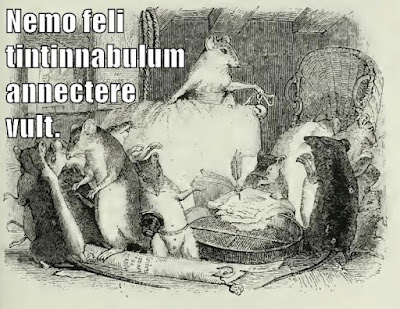Bos ad aquam tractus non vult potare coactus.
Notice the medieval rhyme: tractus-coactus. Compare the English saying, "You can lead a horse to water, but you can't make him drink."
Qui vult caedere canem, facile invenit fustem.
Compare the English saying: "It is easy to find a stick to beat a dog."
Cattus comedit pisces sed non vult humectare pedes.
Felis amat piscem, sed non vult tangere flumen.
This famous proverb is alluded to in Shakespeare's Macbeth: "like the poor cat in the adage."
Nemo feli tintinnabulum annectere vult.
This proverb prompted the Aesop's fable about the cat and the bell. Here's an illustration by Grandville:
Deus dat cui vult.
There's an implied ei: "Deus dat (ei), cui vult." And, of course, to whom he does not want to give, he does not.
Quod deus vult fiet.
There's an implied hoc: "(Hoc) quod deus vult, fiet." Note the future tense: fiet.
Quos deus perdere vult, dementat prius.
Quem Iuppiter vult perdere, dementat prius.
Stultum facit Fortuna, quem vult perdere.
These are all variations on the same idea, with either "deus" or "Iuppiter" or "Fortuna" as the divinity in charge. As you can see, "facere stultum" is synonymous with "dementare."
Qui totum vult, totum perdit.
Compare the English saying, "Grasp all, lose all."
Vult et non vult piger.
Compare the Aesop's fable about the lazy boy in bed. Here's a Latin LOLCat:
Beatus est qui vivit ut vult.
Remember that "ut" with the indicative means "as" (more about ut).
Qui vult nucleum, frangat nucem.
Note the subjunctive: frangat.
Deficit ambobus, qui vult servire duobus.
This is a rhyming medieval proverb: ambobus-duobus. Compare the Biblical saying in Matthew 6: "Nemo potest duobus dominis servire."
Haurit aquam cribro qui discere vult sine libro.
Another rhyming medieval proverb: cribro-libro.
Os qui non claudit, quod non vult, saepius audit.
And yet another rhyming proverb: claudit-audit.
Qui pedit dum vult, pedet dum pedere non vult.
Yes, "pedere" really does mean "to fart."
Discere si vultis, prodest sapientia multis.
Here you see the second-person plural form: vultis, rhyming with multis.
Quaecumque vultis ut faciant vobis homines, et vos facite illis.
This is another of those "golden rule" sayings, expressed in second-person plural form. Note the subjunctive, facianti, with the pronoun quaecumque.


No comments:
Post a Comment
Comments are limited to Google accounts. You can also email me at laurakgibbs@gmail.com or find me at Twitter, @OnlineCrsLady.